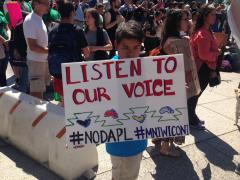Three years have passed since the end of the former leftist administration in El Salvador, and popular social movement groups are decrying that the country is dangerously heading towards the consolidation of a dictatorship. This was expressed on June 1st by hundreds of people who gathered in various parts of El Salvador and in other cities abroad, such as Washington D.C., to denounce human rights setbacks under President Nayib Bukele on his third anniversary in office.
As a representative of the Popular Resistance and Rebellion Bloc, Marisela Ramírez, summarized, the Bukele’s administration has meant “three years of the most serious and systematic violations of human rights since the Peace Accords were signed, with persecution of the press, political, religious and academic opponents, a dramatic rise in disappearances and the tripling of the number of migrants fleeing the country for fear of violence or hunger in search of a better life and also political asylum. [In sum] an inadmissible, intolerable, and condemnable setback.”
Social movement organizations also denounced the current government’s threats to democratic institutions, such as the de facto annulment of the other branches of government that have now functionally come under control of the executive branch and the rolling back of the right to public information, including the diminishment of the role played by the Institute for Access to Public Information as well as making classified much of the information related to public spending.
The Vice-Rector of the University of Central America José Simeón Cañas (UCA), Omar Serrano, said in an interview that, in the last three years, “the dissolution of the separation of powers, the co-optation of all public institutions, the different measures to restrict freedom of expression [and] freedom of the press have confirmed that the president has chosen an authoritarian, autocratic path and it seems that he is willing to continue walking it.”
Similarly, the coordinator of Transparency International El Salvador, Roberto Rubio, affirms that “we definitely have an authoritarian drift that is manifested in several fields: the very concentration of the three powers in practically one person shows it. Decision-making is totally vertical; it is the consummation of the Holy Trinity.”
For their part, environmental organizations have denounced the lack of commitment to the ratification of the human right to water and the lack of advancements in environmental matters. They are also warning of a possible “worsening of the environmental crisis that is already impacting the country,” including “the deforestation and destruction of mangroves forests that will be caused by megaprojects” being promoted by the government, such as Bitcoin City, a new airport and the Pacific Train.
One of the most widely questioned environmental reforms has been the passage of a Water Resources Law which, according to these organizations, favors corporate interests to the detriment of environmental sustainability and does not guarantee access to water for the broad majority of the population.
In addition to these demands, there is growing discontent in El Salvador over the rising prices of the food and other basic goods. In the past year, inflation soared by 7%, a figure not reached since 2011. The monthly cost of food and basic living expenses has reached $650, which is nearly double the minimum wage for workers in the formal sector.
These challenges are all taking place in the context of a nationwide State of Exception that has been in force since March 27 of this year. The State of Exception, which suspends various constitutional rights and has led to the arrest of over 37,000 people, was approved by the Legislative Assembly at the request of the Executive in response to a tragic spike in homicides that left more than 80 dead within 72 hours. Reporting by online news outlet El Faro suggests that the homicides resulted from a breakdown of an alleged agreement between the government and the gangs.
Human rights organizations warn that the State of Exception, which has doubled the size of the prison population in less than three months, primarily criminalizes young people from stigmatized communities, and have registered more than a thousand reports of arbitrary detentions and other human rights violations. Amnesty International has confirmed the deaths of at least 18 deaths of people while in custody, whether from violence, lack of medical attention of poor prison conditions.
Under the State of Exception, union leaders and voices critical of the government have also been imprisoned. Meanwhile, dozens of journalists and human rights activists have already had to leave the country for fear of suffering the same fate.
Faced with this current reality, the Salvadoran social and popular movements are regrouping and mobilizing. Since September 2021, popular social movement groups have taken to the streets again and again to protect the hard-won gains of over fifty years of struggle for democracy. More broadly, over the last three years the struggle against authoritarianism and privatizing megaprojects, as well as the mobilizations for the rights of women and Indigenous peoples have continued to expand and grow stronger, as have international solidarity actions, to demand for social justice for the people of El Salvador.

